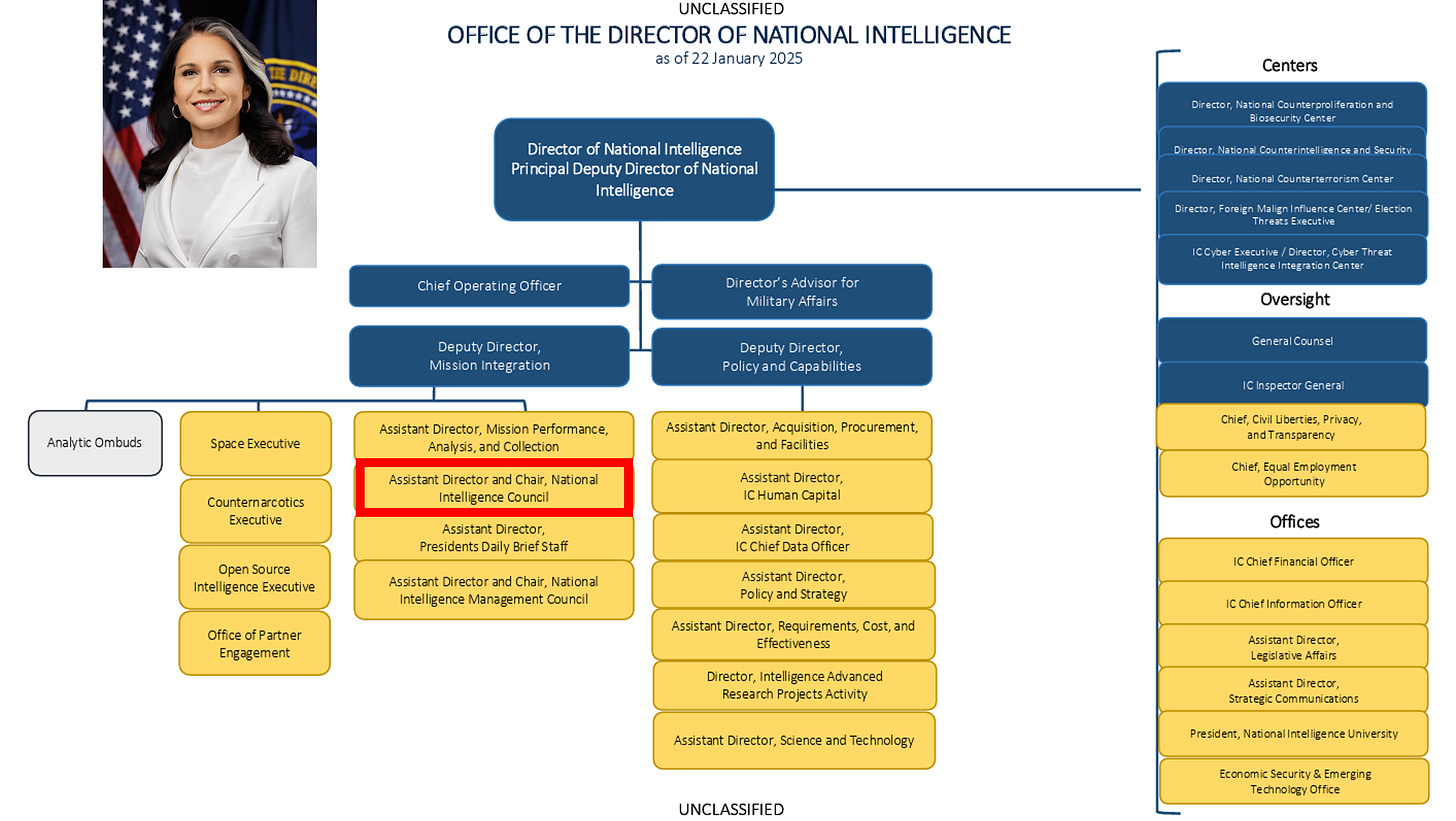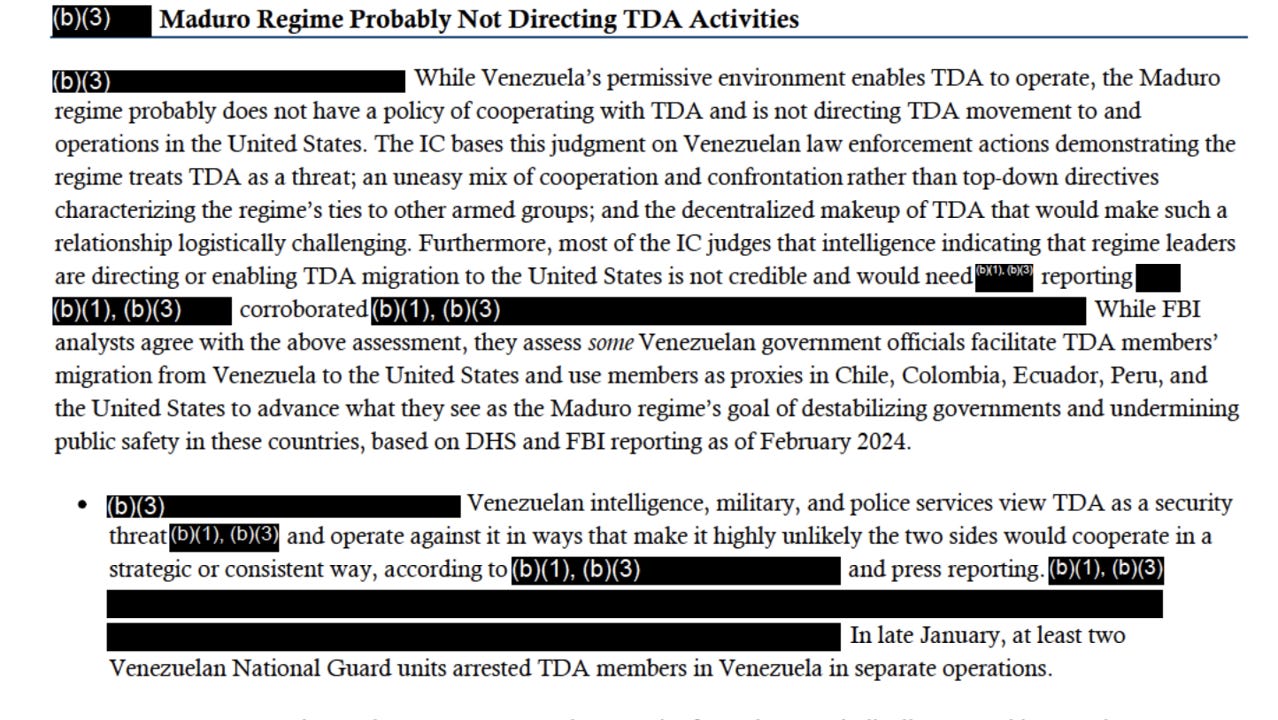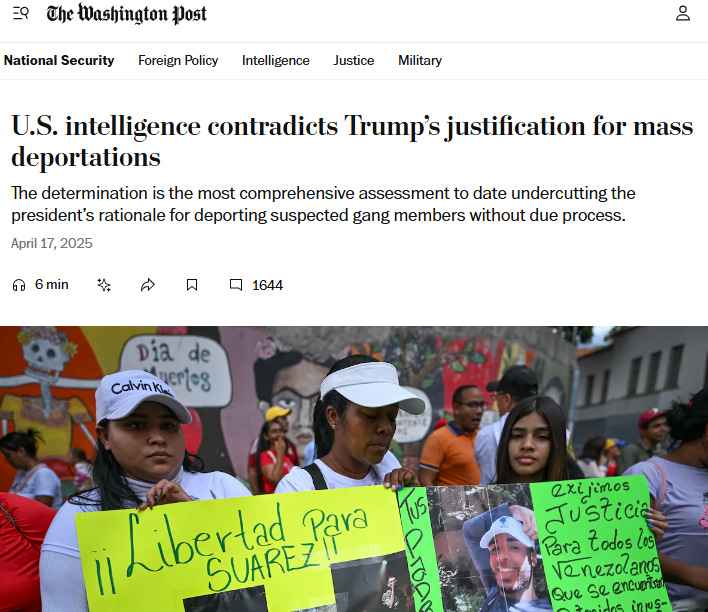Last week, Tulsi Gabbard, appointed by President Trump as the Director of National Intelligence, fired the top two officials of the National Intelligence Council (NIC) after The Washington Post and the New York Times reported that the Trump Administration had ignored the findings of its NIC related to its deportation efforts. Today, I explain what is going on, setting the stage for a forthcoming discussion of the significance of these events for the politicization of expert advice.
On Friday the U.S. Supreme Court ruled that the Trump Administration could not deport a group of Venezuelans under the 1798 Alien Enemies Act until a lower court ruled on the legality of the Administration’s invocation of the AEA and subsequent appeals played out.
There are two big issues in dispute. One legal, involving judicial interpretation of the AEA, which has only been invoked three times — in the War of 1812, and in World War 1 and World War 2.
Justice Kavanaugh, who joined the majority 7-2 decision, described the legal questions as follows:
The underlying legal questions that the courts may need to decide before the removals occur include: (i) whether the Alien Enemies Act (as distinct from the ordinary removal process under the Immigration and Nationality Act) authorizes removal of these detainees and (ii) if so, what notice is due before removal.
The second big issue is empirical — are the Venezuelan’s subject to deportation members of a terrorist organization, Tren de Aragua (TdA), involved in an “invasion” of the United States under the direction of the government of Venezuela, which must be true to justify invocation of the AEA?
On March 15, 2025 the Trump Administration issued a proclamation that asserted:
I find and declare that TdA is perpetrating, attempting, and threatening an invasion or predatory incursion against the territory of the United States. TdA is undertaking hostile actions and conducting irregular warfare against the territory of the United States both directly and at the direction, clandestine or otherwise, of the Maduro regime in Venezuela.1
The language of the proclamation follows the requirements of the AEA, which can be invoked when there is an “invasion or predatory incursion [that] is perpetrated, attempted, or threatened against the territory of the United States by any foreign nation or government.”
Other legal questions aside, the Trump Administration’s invocation of the AEA hinges on whether or not (a) the detained Venezuelans are in fact members of TdA and (b) whether TdA is under the “direction” of the Venezuelan government led by President Nicolás Maduro, who is not recognized as legitimate by the United States. Today, I focus on this latter question.
How would President Trump know whether or not the Maduro regime is directing TdA to “invade” the United States? The answer is U.S. national intelligence, whose job it is to advise policy makers on matters of national security.
This long introduction brings us to the subject of expert advice, and in this case, intelligence, specifically the National Intelligence Council (NIC). The organizational chart below shows (in the red box) where the NIC sits in the Office of the Director of National Intelligence (ODNI), which is currently led by Director Tulsi Gabbard.

The NIC is responsible for producing National Intelligence Estimates (NIEs), which the Congressional Research Service (CRS) characterizes as “the highest and most formal level of strategic analysis by the U.S. intelligence community.” CRS explains:
The NIC consists of senior analysts from the intelligence community and substantive experts from the public and private sector. After a decision is made to prepare an NIE, terms of reference (TORs) that define the major issues and drafting responsibilities are circulated to relevant intelligence agencies. One or more analysts, either from the ODNI or an intelligence agency, is asked to prepare a draft NIE. The draft estimate is then coordinated by senior officials of all intelligence agencies in a process that can be quite lengthy. Thereafter, NIEs are formally considered by the heads of relevant intelligence agencies and the DNI. The National Security Act requires that NIEs include, “whenever the Council considers appropriate, alternate views held by elements of the intelligence community.” Thus they may contain text, or “footnotes,” that pose alternative views from the judgments in the NIE. The conclusions of NIEs, however, are understood to reflect the official position of the DNI. Once approved, the NIE is forwarded to the President, senior policymakers, and the two congressional intelligence committees.
About three weeks before President Trump issued his Alien Enemies Act proclamation, the NIC produced an intelligence estimate that concluded that TdA was not under the direction of the Maduro regime, contradicting the claims of the subsequent proclamation — On March 20, the New York Times reported:
President Trump’s assertion that a gang is committing crimes in the United States at the direction of Venezuela’s government was critical to his invocation of a wartime law last week to summarily deport people whom officials suspected of belonging to that group.
But American intelligence agencies circulated findings last month that stand starkly at odds with Mr. Trump’s claims, according to officials familiar with the matter. The document, dated Feb. 26, summarized the shared judgment of the nation’s spy agencies that the gang was not controlled by the Venezuelan government.
The disclosure calls into question the credibility of Mr. Trump’s basis for invoking a rarely used wartime law, the Alien Enemies Act of 1798, to transfer a group of Venezuelans to a high-security prison in El Salvador last weekend, with no due process.
The next day, the Department of Justice announced a criminal investigation into the disclosures made to the NY Times, characterizing the claims that the intelligence community had concluded that the Maduro regime was not directing TdA as “inaccurate” and “false information” and “motivated by efforts of the Deep State.”2
It would not be long before we all were provided a chance to compare the NY Timesreporting to the actual intelligence, thanks to a successful FOIA request from the Freedom of the Press Foundation. On April 7, the Trump Administration declassified and released an updated version of a “Sense of the Community Memorandum,”which summarized the intelligence community’s conclusions on the role of the Maduro regime in directing TdA.

Four days after the New York Times and The Washington Post reported that the Trump Administration’s proclamation was contradicted by the findings of the National Intelligence Council, Gabbard’s acting chief of staff asked the NIC to have a second look at their conclusions. That is why the date of this memo — the second look — was April 8.
The New York Times reported on May 6:
The following Monday [24 March 2025], Joe Kent, the acting chief of staff for Tulsi Gabbard, the director of national intelligence, told a senior intelligence analyst to do a new assessment of the relationship between Venezuela’s government and the gang, the officials said. The analyst, Michael Collins, was serving as the acting chair of the National Intelligence Council at the time.
An official who has reviewed messages about the assessment said Mr. Kent made the request to Mr. Collins in an email, asking him to “rethink” the earlier analysis. The official said Mr. Kent was not politicizing the process, but giving his assessment and asking the intelligence officials to take into account the flows of migrants across the border during the Biden administration.
We now know that the analyst, acting chair of the NIC Michael Collins, was the potenntial subject of a DOJ criminal investigation while undertaking that second look. Despite that posible incentive to change his views, Collins’s second look came to much the same conclusions as the first look. Subsequently, ODNI Director Tulsi Gabbard referred Collins and his deputy to DOJ for criminal prosecution,
The New York Times explains why the second memorandum was released so quickly following the FOIA request, which the Trump administration could have been stonewalled indefinitely:
[Kent’s — Gabbard’s acting chief of staff] reaction to the final memo was surprising, the officials said: Mr. Kent was happy about it, and pushed to have it declassified so that it could be discussed publicly, the officials said.
Mr. Kent’s request for declassification set in motion a chain of events that led to the agency’s release of the report this month in response to a Freedom of Information Act request. Because the memo directly contradicts what Mr. Trump claimed — and is now public as an officially acknowledged document — it is generally seen as a legal and public relations fiasco for the administration.

Following reporting that the Trump Administration had contradicted its own intelligence, ODNI Gabbard fired Michael Collins and his top deputy, characterizing them as “radically opposed to Trump” and announced that the NIC would be physically relocated to her office to prevent future politicization of intelligence:
Director of National Intelligence Tulsi Gabbard has fired the top officials leading the National Intelligence Council – whom whistleblowers describe as “radically opposed to Trump” — and has moved the agency to the Office of the Director of National Intelligence, or ODNI, to ensure she can block any “politicization of intelligence,” Fox News Digital has learned.
Gabbard fired Mike Collins, who was serving as the acting chair of the National Intelligence Council, and his deputy, Maria Langan-Riekhof, Tuesday, senior intelligence officials told Fox News Digital.
After all this drama, what do we actiually know?
First, neither I nor you know whether or not the Venezuelan government is directing TdA to invade the U.S. and thus justifying the invocation of the Alien Enemies Act of 1798. Much more importantly, neither will the courts. Arguably, this series of events has badly compromised the NIC and its ability to produce intelligence that is broadly trusted.
Based on the contradictory claims of the White House and the NIC, there will instead be three positions:
- The intelligence community is full of Trump-hating Deep State operatives who have weaponized flawed intelligence against the Trump administration;
- The Trump Administration has sought to manufacture intelligence that supports its aims and punish those who call things straight, even when inconvenient to the administration;
- There is no way to actually know what is true and what is fiction.
The first two positions above will no doubt be held by those with strong political leanings in support or opposition of President Trump and his policies. This is an example of the pathological politicization of expert advice — where judgments of the truth or falsity of a claim is determined by its political significance.
The third stance is where I am and that is a huge problem for the effective use of intelligence in national security policy making — which is a huge problem, because intelligence matters.
In Part 2, I’ll discuss the broader context of the ODNI and the NIC as expert advisory bodies and suggest what a much more effective approach to securing intelligence would look like.
One thing we all should be able to agree on — this ain’t it.
This post was originally published on Roger’s Substack, The Honest Broker. If you enjoyed this piece, please consider subscribing here.
1 The proclamation continues: “I make these findings using the full extent of my authority to conduct the Nation’s foreign affairs under the Constitution. Based on these findings, and by the authority vested in me by the Constitution and the laws of the United States of America, including 50 U.S.C. 21, I proclaim that all Venezuelan citizens 14 years of age or older who are members of TdA, are within the United States, and are not actually naturalized or lawful permanent residents of the United States are liable to be apprehended, restrained, secured, and removed as Alien Enemies. I further find and declare that all such members of TdA are, by virtue of their membership in that organization, chargeable with actual hostility against the United States and are therefore ineligible for the benefits of 50 U.S.C. 22. I further find and declare that all such members of TdA are a danger to the public peace or safety of the United States.”
2 Here is the full DOJ statement: “The Justice Department is opening a criminal investigation relating to the selective leak of inaccurate, but nevertheless classified, information from the Intelligence Community relating to Tren de Aragua (TDA). We will not tolerate politically motivated efforts by the Deep State to undercut President Trump’s agenda by leaking false information onto the pages of their allies at the New York Times. The Alien Enemies Proclamation is supported by fact, law, and common sense, which we will establish in court and then expel the TDA terrorists from this country.”